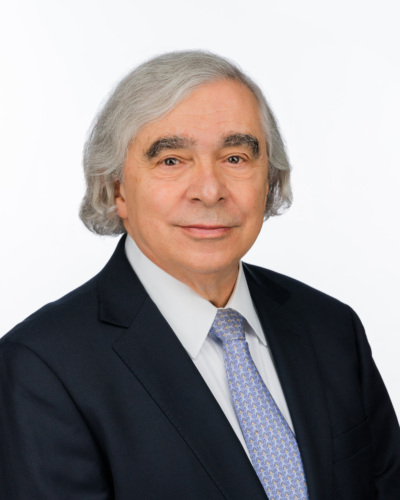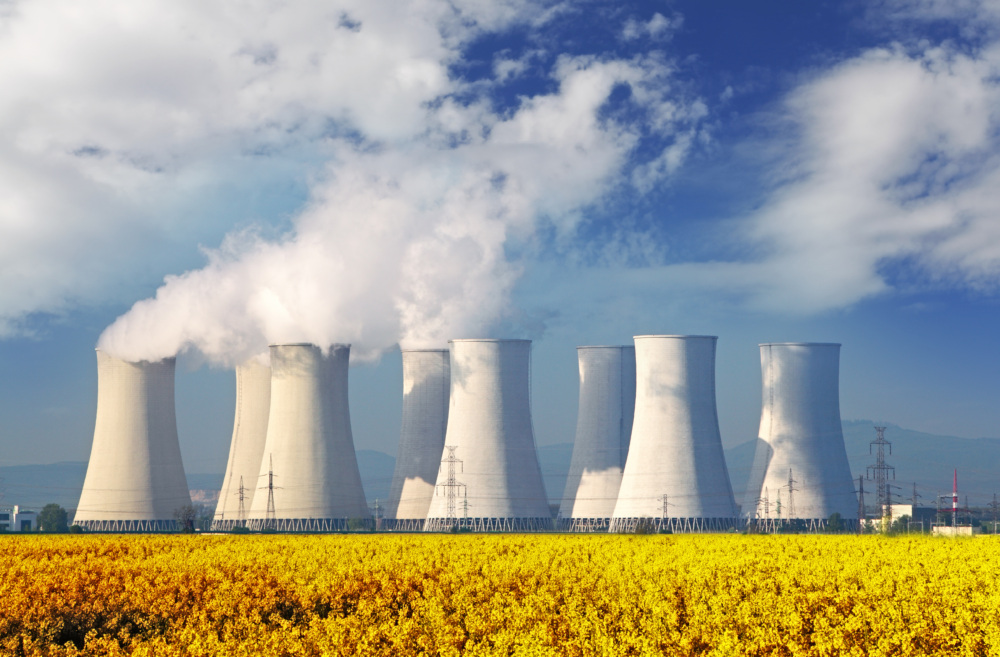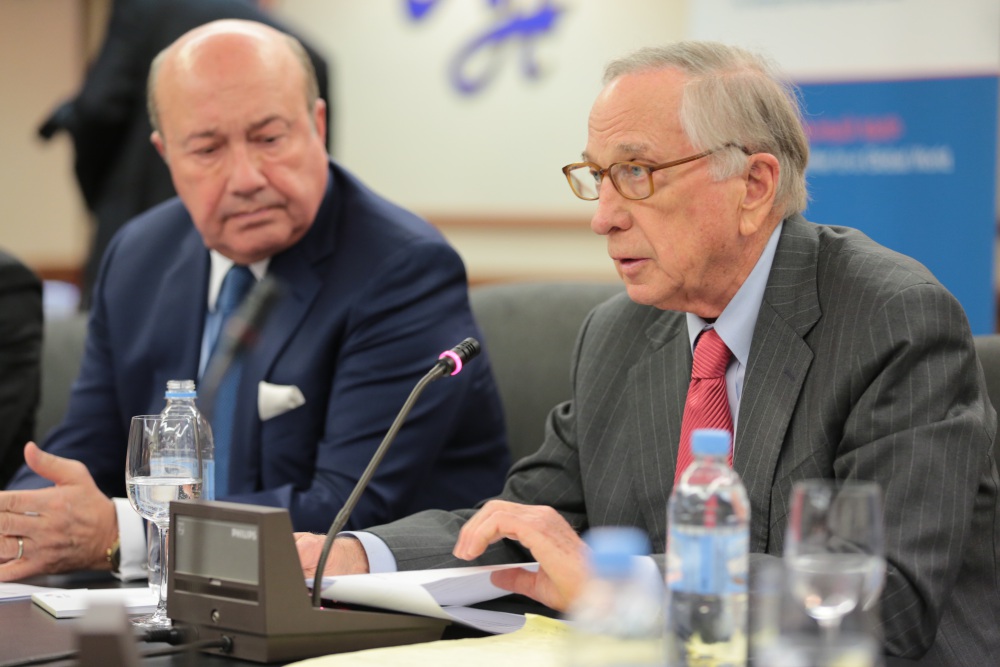
Ernest J. Moniz
Co-Chair and Chief Executive Officer, NTI
MR. DAVID WESTIN: So often in life and in news, let's be frank, the urgent drives out the important. And when it comes to important, there is nothing more important than the question of the threat of nuclear weapons worldwide.
The Nuclear Threat Initiative just issued its most recent biennial report and it's a mixed bag. On one end, worldwide efforts to secure and eliminate deadly nuclear materials have made real progress – reducing the number of countries with dangerous materials from 32 to 22. On the other hand, most progress is at some risk because of instability around the world, including some potential instability right here in the United States.
Here to take us through the report is the CEO of the Nuclear Threat Initiative, Ernest Moniz. Dr. Moniz served as Energy Secretary under President Obama. He is a professor of physics at MIT. He comes to us today from Cambridge, Massachusetts. So Mr. Secretary, thank you very much for being with us.
SEC. MONIZ: Thank you, David.
WESTIN: Give us the report card basically.
MONIZ: Well, you've said it well. First of all, two more counties eliminated all of their nuclear weapons usable material to bring this down to 22 from 32. That's real progress. And we've had countries from Japan to China that have substantially improved their security in materials, keep them out of the hands of terrorists. And we've also had — and I should say that we had more than three-quarters of all countries with nuclear facilities improve their resistance to sabotage.
The bad news, however, as you also said, is that there are deteriorations in terms of the political environment in many countries and that can influence, elevate risk and also there are new threats like cyber security where we still have roughly a third of all the countries with nuclear facilities that have no basic cyber security protections at all. So cyber, we point out in this report, is certainly one of the areas where we will be looking for tremendous progress in the next couple of years.
WESTIN: So Mr. Secretary, you know, we Americans tend to be competitive and my eye was drawn to where we rank among the 22, and we just put up our slides, one of which indicates where we rank with respect of the amount of material — and that is number 12 out of 22. And with respect to sabotage threats, it's 11 out of 22. We're in the middle of the pack. Why aren’t we doing better?
MONIZ: I think we need to keep a focus, which frankly I think the Obama Administration had, in terms of elevating these issues as primary issues. Secondly, as the Economist Intelligence Unit, which did the research for us, points out, there are frankly some governance questions, among them are things like so many of our senior positions in the government going unfilled for so long in this new administration.
Don't get me wrong, it's not like we're at the bottom of the pack, but as you said, we're in the middle, we should be doing better and certainly consolidation of materials, elimination of weapons materials is a place where we need to have more focus.
WESTIN: Let's talk specifically about the things that most of us think about and those are Iran and North Korea. What is the level of risk with respect to, for example, first Iran? Is that getting safer or more dangerous for the world?
MONIZ: Well, a big issue is what happens particularly in November when the president, the administration have promised to put draconian sanctions on Iran, including on their oil exports. And the question ultimately is, “Will Iran continue to comply with the agreement that we negotiated in 2015?” The reason that's so important in this context is that the agreement has an unprecedented and unique set of requirements on Iran in terms of providing visibility into their nuclear program. That, therefore, gives them also a certain protection against sabotage, against theft. So frankly if the deal is no longer followed, the loss of what are called safeguards will certainly enhance the possibility of theft or sabotage in Iran of nuclear materials, of nuclear facilities.
WESTIN: What about North Korea? The president clearly thinks he's making progress there. I mentioned the tweet that he tweeted out earlier about why they're not putting ICBMs in their parades anymore, they're talking about development. Is that getting to be a safer situation in your estimation or in the estimation of the NTI?
MONIZ: Well, I would say not yet. In fact, looking at those rankings that you said, North Korea is at the bottom of the heap, and a big reason for that is that there is no transparency into what is going on in North Korea. We really don't know. Now, if there is progress and negotiation, which I think will have to be a very long step-by-step approach with North Korea, and that leads to international inspectors being allowed back into North Korea, etc., well, clearly just as with Iran in the current situation, North Korea will move to a situation where we would know a lot more about where materials are. And that itself would be a real help against diversion of those materials, so we would enhance the security environment. But those are all big ifs, because the reality is we haven't seen a lot of progress in the negotiations since the summit between President Trump and Kim Jong-un.
WESTIN: Moving beyond the specifics of nuclear threat, let's talk about cyber security a bit more. You mentioned it in connection with nuclear materials; let's talk about it in terms of our energy grid, energy security right here in the United States. What is your assessment of where we stand right now protecting our energy grid?
MONIZ: Well, you know, so far we have not had a major incident in the United States as has happened in some other countries. But the reality is we're not where we need to be. We are always scrambling to keep up the level of cyber security among our energy deliverers, especially electricity. It's very uneven. Now here I think when we were at the Department of Energy and in the current administration, the Department of Energy I think is doing a very good job in working with utilities to make sure that there is better information sharing, including intelligence sharing because we have given a number of the critical CEOs security clearances to be able to understand the threats.
And the thing is now for those utilities to keep moving. You cannot just have a standard and stand still because obviously the cyber attackers are always finding new entry points. The attacks on our system are legion, they are many, whether it's the electricity system, the natural gas system and others. And so I think we are succeeding in elevating the understanding of the level of threat, but it's really hard frankly to just keep up and to have all of our different energy deliverers who vary in such great scale for example, to have a uniform approach, because the weak point will be the entry point for cyber attack.
WESTIN: And briefly, in conclusion, let's move beyond manmade threats into mother nature, maybe with a little encouragement from humans. Where are we in the threats posed to the United States and to the world economy for that matter from climate change?
MONIZ: Well, the climate risks are…extremely real. And certainly this summer we have seen all of the predicted signatures of that from coastal surges and storms to droughts and wildfires and the like here in the United States. That's only going to get worse. And so we must address this. The good news or the semi-good news I suppose is that over the last decade we have made progress in eliminating our carbon emissions.
Hopefully, we will be able, despite the president's announcement of last year with regard to withdrawing from the Paris agreement, hopefully we will still through governors, through business leaders, be able to meet out Paris targets.
But I have to say if we are going to really minimize the threats to our economy, to our health, to our security from climate change, we are going to have to pick up the pace dramatically and by mid-century we are going to have to have essentially a very, very low carbon energy economy. A lot of work to do.
The good news is that energy technology innovation continues to go great guns historically and what we need is that innovation to be supportive, to be continued and to be synergistic with new policies that allow those technologies to deploy rapidly in our energy marketplace.
WESTIN: Professor Ernest Moniz of the Nuclear Threat Initiative, thank you very much for being with us today.
Sign up for our newsletter to get the latest on nuclear and biological threats.
To make good on their COP28 pledge, countries need a new approach to building, regulating, and financing nuclear technology.
The NTI Index is recognized as the premier resource and tool for evaluating global nuclear and radiological security.


